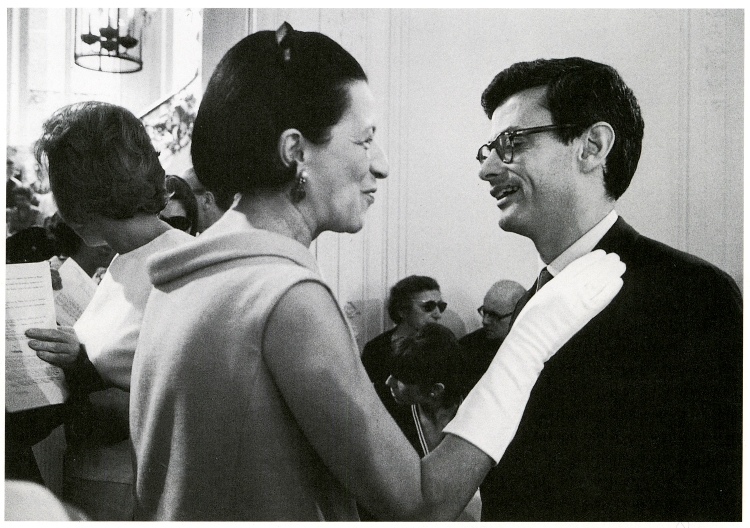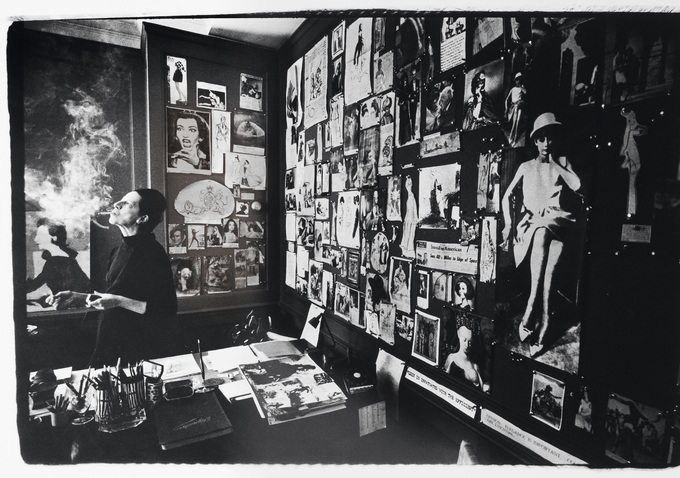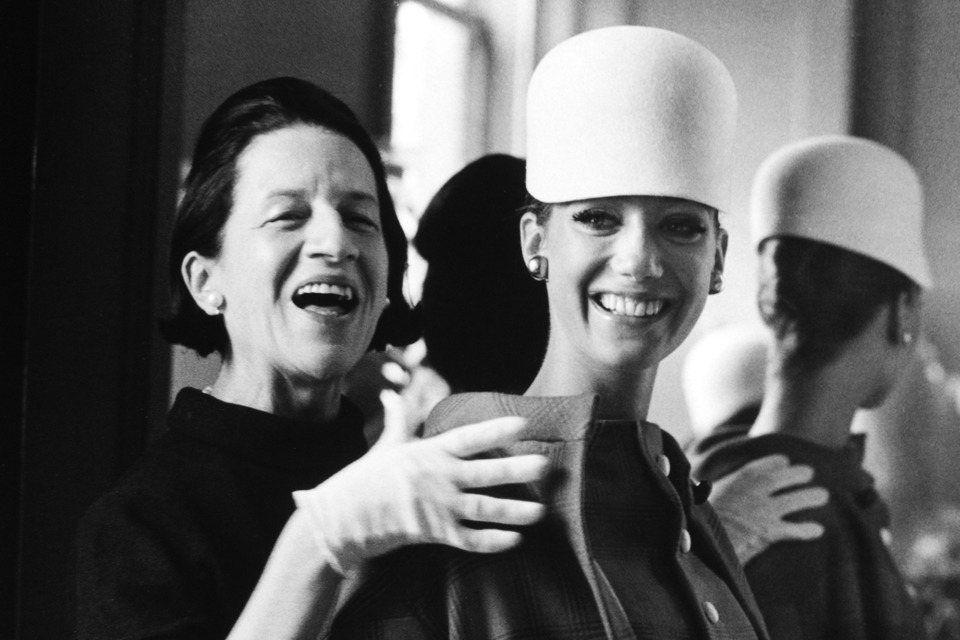It is said of many people, but for Diana Vreeland it was true: she remains fashion’s once and future queen. An enduring legend of a notoriously vicious and ephemeral world, the Paris-loving Anglo-American had a magical life as a heralded columnist and editor for Harper’s Bazaar, Vogue and the Metropolitan Museum of Art. Not blessed with what one may call traditional beauty, Vreeland understood style - proportion, colour, flair, flow and accent. She spoke the way we want all fashion people to speak: “Pink is the navy blue of India”, “Blue jeans are the most beautiful thing since the gondola,” and “You gotta have style. It helps you get up in the morning. It's a way of life. Without it you're nobody. And I'm not talking about a lot of clothes.”
Naturally, a documentary about such a women must be fun, inspiring and informative and Diana Vreeland: The Eye Has to Travel has masses of the first two while being a bit shy on the last. No matter, though, because any mention of Vreeland is so über that you could put her sock drawer in a shop window and draw crowds.
 Alongside the thankless result of the Bob Marley documentary by a fettered Kevin Macdonald earlier this year or the odd, saggy doco of Ray and Charles Eames, Eames: The Architect and The Painter, this Vreeland doc too feels vetted and safe: there is nothing smacking of infamy or scandal, nor of alarm or even a slight tisk. Written by Lisa Immordino Vreeland (granddaughter-in-law) and co-directed by Bent-Jorgen Perlmutt and Frederic Tcheng, this talking-head-laden, alarmingly pedestrian documentary whiffs by thanks to a wonderful cloud of archive images and footage. The best way to enjoy The Eye Has to Travel? Ignore the fact that stylistically this documentary is the equivalent of grey Velcro support shoes. Instead, “feel the hand”.
Alongside the thankless result of the Bob Marley documentary by a fettered Kevin Macdonald earlier this year or the odd, saggy doco of Ray and Charles Eames, Eames: The Architect and The Painter, this Vreeland doc too feels vetted and safe: there is nothing smacking of infamy or scandal, nor of alarm or even a slight tisk. Written by Lisa Immordino Vreeland (granddaughter-in-law) and co-directed by Bent-Jorgen Perlmutt and Frederic Tcheng, this talking-head-laden, alarmingly pedestrian documentary whiffs by thanks to a wonderful cloud of archive images and footage. The best way to enjoy The Eye Has to Travel? Ignore the fact that stylistically this documentary is the equivalent of grey Velcro support shoes. Instead, “feel the hand”.
Not that fashion docs need to poke at a gruesome underbelly. (We mustn’t believe Zoolander’s Mugatu is fashion reality. Let’s opt for The Incredibles’ Edna Mode.) Fashion is all about energy, curiosity and calculated risk. Only those evil fashion magazines equate style with money you have yet to earn. Feared, adored and respected, Vreeland may have brought those glossy mags into their glory but she never ever said it was about money or looks.
 Vreeland grew up in Paris and charmed her way into the social elite. Her American socialite mother knew her talented daughter was no oil painting. That didn’t stop Vreeland snagging a gorgeous man for a 46-year marriage, having gorgeous children, a fascinating career and a fabled apartment. Best of it all, however, was that Vreeland became a person others listened to. She was simply born to style, both noun and verb. Discovered in New York by another legend, magazine editor Carmel Snow, Vreeland’s column “Why Don’t You” was then and now the stuff of spoof (and it was spoofed – how could you not spoof suggestions like "Why don't you.... Turn your child into an Infanta for a fancy-dress party?") but it was also a revelation. People loved her ridiculous suggestions of how to make your life better through fashion imagination.
Vreeland grew up in Paris and charmed her way into the social elite. Her American socialite mother knew her talented daughter was no oil painting. That didn’t stop Vreeland snagging a gorgeous man for a 46-year marriage, having gorgeous children, a fascinating career and a fabled apartment. Best of it all, however, was that Vreeland became a person others listened to. She was simply born to style, both noun and verb. Discovered in New York by another legend, magazine editor Carmel Snow, Vreeland’s column “Why Don’t You” was then and now the stuff of spoof (and it was spoofed – how could you not spoof suggestions like "Why don't you.... Turn your child into an Infanta for a fancy-dress party?") but it was also a revelation. People loved her ridiculous suggestions of how to make your life better through fashion imagination.

Working with stellar names like Richard Avedon, with whom she had a 40-year career, it may seem surprising at first that Vreeland was a truth bender. Despite her fame or perhaps because of it, she knew life is a better place with a little fantasy. So, do we believe her claims to have known Buffalo Bill or been a Tiller Girl in the Thirties or sold Wallis Simpson underthings for a royal weekend? Coming from the mouth of someone born in 1903, one just can’t be sure. However, one of Diana’s sons insists that his mother did like to “improve” her stories, much as so many modern journalists do. Yet again, Vreeland was ahead of her time.
Vreeland was never afraid to break rules and upset people
Never nasty, bitchy or crude, Vreeland did not mince her words. She may have been, at worst, to the point or unwavering. The freedom she had to say, “YES! THAT!” or “No, no, never that!” is even more refreshing in these days of taking all into maddening consideration. Elegance is, as she once said, refusal. Diana Vreeland was never afraid to break rules and upset people: once I read that she admired the “habit rouge”, the select, strictly dictated outfit of the foxhunting crowd. Knowing first-hand how stringent the dressing standards were, I thought her wise to admire the beauty of functional equestiran clothing, until I read the last line: “…but I would wear some large golden earrings.” That sums up Diana Vreeland entirely: she knew when breaking the rules would expand our notion of what looks good - indeed, the eye has to travel. She’s right. Large gold earrings do look quite nice with a black melton, buff breeches and an ivory ratcatcher, if only they weren’t foolishly unsafe in the field...
As for this frilly, unashamedly enjoyable documentary, it did win a Silver Hugo at the Chicago Film Festival 2011 for best documentary. And why not? Silver’s divine.
Watch the trailer to Diana Vreeland: The Eye Has to Travel















Add comment